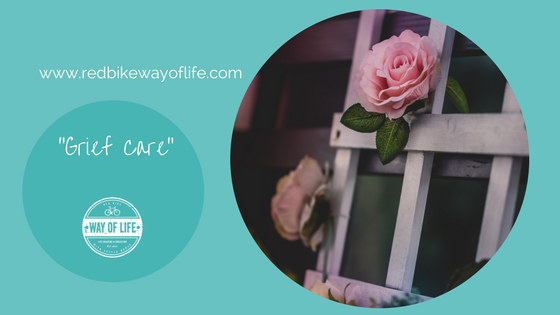
by Shayla Morag | Feb 14, 2018 | Self Care, The Red Bike Way, Wise Words
On this Valentine’s Day, take some time to cherish who ‘you’ are and nurture in the beautiful light that you share freely with others. Do something special for yourself and know that you are loved even if you may feel alone. ???
Listen closely to your heart and follow the signs. What is your intuition telling you? During a get-away respite vacation to visit a dear friend in Florida, I was told by three different people, on three different occasions, to read three specific books by the late Louise L. Hay. People we come across in daily life can give us messages that we need to hear. These ‘You Can Heal Your Life’ books – chalked full of wise life-affirming words – have become well read and treasured on my bookshelf.
Do You Truly Know How to Love Yourself?

by Shayla Morag | Feb 07, 2018 | Change, Self Care, The Red Bike Way
Over 80% of New Year’s resolutions are abandoned within a week. If change were easy, we’d all be wealthy, fit, and happy. It’s frustrating when you know what you want to do, but you can’t get yourself to do it consistently. If the new behavior would obviously be of benefit, why isn’t that change easy to make?
Change is challenging for several reasons:
1. Habits are strong and pervasive. The average person has far more habits than they realize. Each morning, you wake up and follow the same routine. You take the same path to work. You think the same thoughts as you did the day before. Much of your day and night is a repeat of the last 500.
When you feel bored, you soothe yourself in the same 2-3 ways each time. You only eat a few foods regularly. You talk to the same people. Habits avoid thinking. They’re done automatically. Anything that minimizes thinking seems to be your brain’s preference. The fewer decisions, the better. To change, you must be certain that change is in your best interest. Otherwise, your habits will always win.
2. Change is hard because it’s uncomfortable. You already know how to lose 25 pounds or how to find a better job. But the thought of taking the actions necessary to accomplish those goals creates discomfort.
3. What you’re doing is already working, sort of. Your brain is preoccupied with your survival. Our brains are programmed to resist change, because what you’re doing is allowing you to live. Any change could potentially lead to death. You might be unhappy today, but you’re still alive! Most of us prefer misery than facing uncertainty.
4. You’ve tried to change in the past and failed. You’re no dummy. If you’ve tried to change several times and failed, part of you says, “Obviously, I can’t change. What’s the use in trying?”
It isn’t easy to change, but change is possible. The primary issue keeping you from following through on your plan to change is attempting to change too much, too soon. Smaller changes are easier to accomplish and to maintain.
How You Can Change! Change is possible with an effective approach:
1. Be prepared to change. Expect that change will be challenging. Your odds of success improve if you’re prepared. Have a plan.
2. Start small. To minimize the discomfort that change creates, only change a little each week. Meditating for two minutes each day is easier than starting with 60 minutes. The key is to get in the habit of doing the new behavior each day.
3. Have patience. It can take months to make a change permanent. It’s often quoted that a new habit requires 30 days to instill. That’s not true. Studies show that it can take anywhere from a few weeks to several months, depending on the habit and the person.
4. Be willing to change yourself and face the consequences. Changing yourself is scary, because you don’t know what the results will be. Accept that your life will change in some way. Discomfort isn’t always a bad thing.
5. Expect to relapse. Falling off the wagon is to be expected. Attempt to enhance your approach and keep going. Aim for 90% compliance. That’s all you need. Perfection is an illusion that will only serve to destroy your confidence.
Change requires patience with yourself. Understand why it’s so challenging to change and choose to make changes slowly and incrementally. Imagine how much you could change over a few years if you changed just a tiny amount each week. The results would be staggering! How much have you changed over the last few years? Give slow change a chance.

by Shayla Morag | Feb 03, 2018 | Grief, Self Care, The Red Bike Way
During the healing journey, it is often recommended to find something new to learn or experience to help with the process of acceptance. There are 7 steps to mastering a new skill. If you learn the right skills, you can be wealthy, play a musical instrument, have a great new relationship, or juggle five balls. Mastering a new skill is a skill in itself. There are several ideas to keep in mind as you learn a new skill. Setting goals, getting expert coaching, and having reasonable expectations are all important.
Master a new skill quickly and efficiently with these strategies:
1. Choose an appropriate skill. You don’t have time to learn everything, so pick something meaningful. It can either be a skill that will greatly aid you in some way or a skill that you find fascinating. If the new skill doesn’t fit into one of these two categories, you’re unlikely to stay motivated enough to master it.
2. Set both long-term and short-term goals. Your long-term goal is mastering your chosen skill. Just how good do you want to be? The short-term goal is no more than 12 weeks in the future. At the end of this short time, you set a goal for how far you want to be after the next few months. This will keep you focused on making continuous progress.
3. Have reasonable expectations for your progress. Your ultimate progress is virtually unlimited. However, there is a limit to how much you can accomplish in 12 weeks. Realize that you’re unique and your rate of progress could be faster or slower than average.
4. Breakdown the skill into its components. For example, playing the piano isn’t just about hitting the correct keys in the correct order. It has several skills interwoven into a larger skill. To be a good pianist, you must be able to do several things well:
- Sight-reading
- Compensating for the fact that some fingers are much stronger than others
- Understanding music theory
- Scales
- Arpeggios
- Dynamics
5. If appropriate, get a coach. You can learn to play piano by yourself, but you’ll have a hard time finding a high-level pianist that didn’t receive expert instruction. At the very least, find materials created by an expert. These may be in the form of books, videos, webinars, or websites. Even periodic meetings with a coach can keep you on the right track
6. Focus on what’s most important. The old adage that 20% of your efforts will account for 80% of your results is true. Determine which activities and skills will yield the greatest results. Most people focus on the activities that are the easiest or the most interesting. Avoid being that person. Your progress will be faster if you focus on the most important tasks.
This is often referred to as deliberate practice. Banging on the piano keys while you catch the end of Rocky V isn’t the same as focusing all of your attention on learning how to play a C with both hands.
7. Get started quickly. Avoid falling into the trap of gathering an excessive amount of information before you get started. The person that masters a skill is the one that spend his time wisely. Watching videos of someone playing the piano isn’t a substitute for doing it yourself. Dive into the practical part of mastery quickly.
You’ll be surprised by how quickly you learn if you choose an appropriate skill, focus on the most effective tasks, and practice consistently. Choose a skill that will add value to your life and you’ll benefit from it forever. Learning a new skill can change your life and help you embrace grief.

by Shayla Morag | Feb 01, 2018 | Handy Tips, Self Care, The Red Bike Way
Everyone has good days and bad. When faced with a bad day, do everything you can to make the most of it. You can accomplish something worthwhile, no matter how bad of a day you’re experiencing. Here are 9 tips to survive a bad day and make the most of it:
1. Avoid behaviors that make a bad day even worse. Complaining, overeating, yelling at a coworker or loved one, or drinking are just a few ways to potentially make a bad day worse. Why throw gasoline on the fire? Keep your wits about you and hold on. Tomorrow is a new day. It might be your best day ever.
2. Maintain your perspective. Maybe your boss hates your report, but it beats the heck out of living under a bridge. No matter how bad your day is, it could be a lot worse. And many are faced with far worse each and every day. Things will get better.
3. Meet with a friend for dinner. People love drama as long as it isn’t their own. Your friend would love to hear about your bad day over a delicious dinner. You can tell your story and unburden yourself, all while enjoying your favorite restaurant.
4. Remember that it’s just one day. You can handle one bad day. You’ve already successfully survived many in the past. Finish the day but look forward to tomorrow. Things can only get better, right?
5. Avoid making any important decisions. A bad day isn’t the best time to decide to quit your job, give up on your dream of law school, or end a relationship. All of those things can wait until your mood and circumstances have normalized. Again, avoid doing anything that can make your crummy day significantly worse.
6. Make plans that excite you. Decide to get away for the weekend or buy that new iPod you’ve been eyeing for the last few months. Give yourself something to look forward to in the near future
7. Learn a lesson. Is there anything you did to cause your bad day? Could your rough day have been prevented? Can you learn anything from this experience? A rough day isn’t so bad if you learned something useful from it. Make the best of it
8. Breathe. Unless you’re underwater, breathing is always a good idea to relieve tension and regain control of your emotions. Just breathe and get your work done. Completing everything that needs to be done is more challenging when everything seems to be going wrong, but you’ll feel more satisfied at the end of the day if it wasn’t a complete loss
9. Take a nap. Sometimes you can reset your day and your brain by taking a quick nap. Maybe you’ll see your situation in a new light. A nap also provides a needed break.
Deal with your bad days effectively. When you’re experiencing a bad day, focus on survival and completing the most important tasks. Most importantly, avoid using a bad day as an excuse to do something stupid or you might find that it can get worse. Follow these strategies and you’ll get through your rough days in the best ways possible.

by Shayla Morag | Jan 28, 2018 | Self Care
This morning I went to yoga at my favourite spot and the class started with the ‘Yin Bicycle Pose’. ? When we find ourselves on the right path, the universe speaks to us. This happens often when we are in tune with our intuition and are self-aware. Being open to what presents itself in everyday life can almost seem magical. When we schedule self-care in our calendars it is more likely to happen. To continue to pedal forward towards our goals, we need to stop and breathe deeply and reflect on where we want to go – so we can go for it with intention. ♥️






